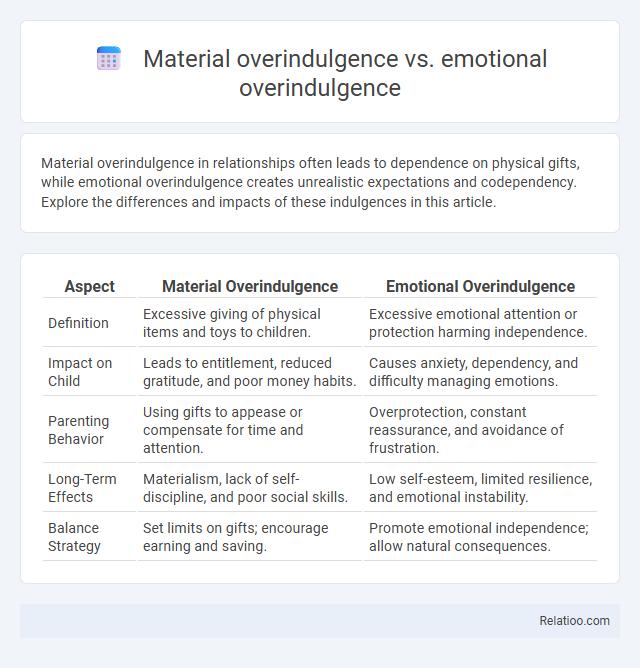Material overindulgence in relationships often leads to dependence on physical gifts, while emotional overindulgence creates unrealistic expectations and codependency. Explore the differences and impacts of these indulgences in this article.
Table of Comparison
| Aspect | Material Overindulgence | Emotional Overindulgence |
|---|---|---|
| Definition | Excessive giving of physical items and toys to children. | Excessive emotional attention or protection harming independence. |
| Impact on Child | Leads to entitlement, reduced gratitude, and poor money habits. | Causes anxiety, dependency, and difficulty managing emotions. |
| Parenting Behavior | Using gifts to appease or compensate for time and attention. | Overprotection, constant reassurance, and avoidance of frustration. |
| Long-Term Effects | Materialism, lack of self-discipline, and poor social skills. | Low self-esteem, limited resilience, and emotional instability. |
| Balance Strategy | Set limits on gifts; encourage earning and saving. | Promote emotional independence; allow natural consequences. |
Understanding Material Overindulgence
Material overindulgence involves excessive desire and consumption of physical goods, often leading to clutter, financial stress, and diminished satisfaction from possessions. Emotional overindulgence differs by focusing on rewarding feelings or soothing discomfort through indulgent behaviors, which can lead to emotional dependency or avoidance. Your understanding of material overindulgence can help you identify patterns of overconsumption and implement healthier spending habits that prioritize long-term well-being over immediate gratification.
Defining Emotional Overindulgence
Emotional overindulgence occurs when caregivers excessively cater to a child's emotional needs, shielding them from experiencing natural consequences or discomfort, leading to dependency and poor coping skills. Unlike material overindulgence, which involves excessive giving of physical goods, emotional overindulgence centers on excessive affection or attention that hinders emotional development. Understanding your approach to emotional boundaries helps prevent overindulgence and promotes healthy emotional resilience.
Root Causes of Overindulgence
Overindulgence stems from deep-rooted psychological and emotional factors, where material overindulgence often arises from consumerism influenced by societal pressures and a desire for external validation. Emotional overindulgence is frequently linked to unresolved inner conflicts and coping mechanisms for stress, anxiety, or low self-esteem. Understanding the root causes of your overindulgence can help address underlying needs rather than just symptoms of excessive behavior.
Comparing Material and Emotional Overindulgence
Material overindulgence involves excessive consumption of physical goods, often leading to clutter and financial strain, while emotional overindulgence centers on overwhelming someone with attention or affection, potentially hindering emotional growth and resilience. You experience material overindulgence through frequent, unnecessary purchasing, whereas emotional overindulgence manifests in constant reassurance or avoidance of setting boundaries. Understanding these distinctions helps maintain balance in both your possessions and personal relationships.
Psychological Impact of Material Excess
Material overindulgence involves excessive accumulation of physical possessions, often leading to increased stress, anxiety, and diminished life satisfaction due to the constant pursuit of more. Emotional overindulgence centers on overgratifying feelings or impulses, which can result in dependency and difficulty managing emotions. Recognizing the psychological impact of material excess is crucial for your mental well-being, as it can create a cycle of desire that undermines emotional stability and long-term happiness.
Consequences of Emotional Overindulgence
Emotional overindulgence leads to dependency issues and impaired emotional regulation, causing individuals to struggle with resilience and self-control. Unlike material overindulgence, which primarily affects financial health, emotional overindulgence disrupts psychological well-being and interpersonal relationships. Prolonged emotional overindulgence can result in increased anxiety, diminished coping skills, and challenges in forming healthy attachments.
Societal Influences on Overindulgence
Material overindulgence often stems from consumer culture promoting constant acquisition of goods, while emotional overindulgence is influenced by societal norms encouraging immediate emotional gratification and validation. Overindulgence in any form is reinforced by media, advertising, and social networks that shape your desires and expectations, often leading to unrealistic satisfaction levels. Understanding these societal influences helps in recognizing patterns that contribute to excess and supports developing healthier self-regulation strategies.
Recognizing the Signs of Overindulgence
Recognizing the signs of overindulgence involves identifying patterns such as compulsive spending, excessive accumulation of possessions, and reliance on material goods for temporary satisfaction in material overindulgence. Emotional overindulgence is marked by chronic emotional dependence, seeking constant reassurance, and difficulty setting personal boundaries, which can lead to unhealthy attachments and stress. Overindulgence in any form typically results in imbalance, manifesting through behaviors like neglecting responsibilities, impaired relationships, and an inability to regulate impulses effectively.
Strategies to Prevent Overindulgence
Strategies to prevent overindulgence focus on setting clear boundaries and practicing mindfulness to recognize triggers behind material and emotional excesses. Material overindulgence requires budgeting and prioritizing needs over wants, while emotional overindulgence benefits from developing healthy coping mechanisms such as journaling or therapy. Consistent self-awareness and self-regulation techniques form the foundation to control any form of overindulgence effectively.
Fostering Healthy Balance in Life
Material overindulgence involves excessive consumption of physical goods, which can lead to financial strain and environmental impact, while emotional overindulgence centers on indulging one's feelings to the point of dependency or avoidance of reality. Overindulgence in any form disrupts personal well-being and relationships, highlighting the importance of setting boundaries and practicing mindful self-regulation. Fostering a healthy balance requires intentional habits that prioritize moderation, self-awareness, and emotional resilience to maintain overall life harmony.

Infographic: Material overindulgence vs Emotional overindulgence
 relatioo.com
relatioo.com